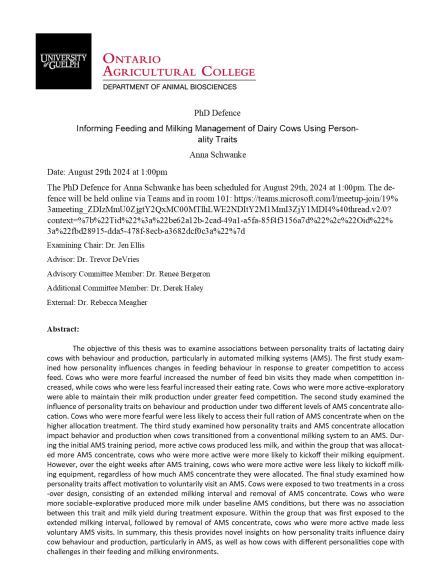Anna Schwanke's PhD Defence
Date and Time
Location
Room 101 and Teams: https://teams.microsoft.com/l/meetup-join/19%3ameeting_ZDIzMmU0ZjgtY2QxMC00MTlhLWE2NDItY2M1MmI3ZjY1MDI4%40thread.v2/0?context=%7b%22Tid%22%3a%22be62a12b-2cad-49a1-a5fa-85f4f3156a7d%22%2c%22Oid%22%3a%22fbd28915-dda5-478f-8ecb-a3682dcf0c3a%22%7d

Details
Informing Feeding and Milking Management of Dairy Cows Using Personality Traits
The objective of this thesis was to examine associations between personality traits of lactating dairy cows with behaviour and production, particularly in automated milking systems (AMS). The first study exam-ined how personality influences changes in feeding behaviour in response to greater competition to access feed. Cows who were more fearful increased the number of feed bin visits they made when competition in-creased, while cows who were less fearful increased their eating rate. Cows who were more active-exploratory were able to maintain their milk production under greater feed competition. The second study examined the influence of personality traits on behaviour and production under two different levels of AMS concentrate allo-cation. Cows who were more fearful were less likely to access their full ration of AMS concentrate when on the higher allocation treatment. The third study examined how personality traits and AMS concentrate allocation impact behavior and production when cows transitioned from a conventional milking system to an AMS. Dur-ing the initial AMS training period, more active cows produced less milk, and within the group that was allocat-ed more AMS concentrate, cows who were more active were more likely to kickoff their milking equipment. However, over the eight weeks after AMS training, cows who were more active were less likely to kickoff milk-ing equipment, regardless of how much AMS concentrate they were allocated. The final study examined how personality traits affect motivation to voluntarily visit an AMS. Cows were exposed to two treatments in a cross-over design, consisting of an extended milking interval and removal of AMS concentrate. Cows who were more sociable-explorative produced more milk under baseline AMS conditions, but there was no association between this trait and milk yield during treatment exposure. Within the group that was first exposed to the extended milking interval, followed by removal of AMS concentrate, cows who were more active made less voluntary AMS visits. In summary, this thesis provides novel insights on how personality traits influence dairy cow behaviour and production, particularly in AMS, as well as how cows with different personalities cope with challenges in their feeding and milking environments.